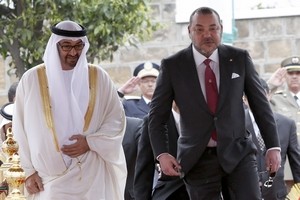The National
Adam Bouyamourn

Sheikh Mohammed bin Zayed, Crown Prince of Abu Dhabi and Deputy Supreme Commander of the Armed Forces , left, and Morocco’s King Mohammed VI, right, attend a ceremony at the Royal Palace in Casablanca on March 17, 2015. Abdeljalil Bounhar / AP Photo
Morocco needs more and better infrastructure to take advantage of its potential as an export and manufacturing gateway to Europe and Africa – and the Arabian Gulf is in an excellent position to provide it, said Aziz Rabbah, the country’s minister of equipment, transport and logistics, in Dubai last month.
“[Morocco] must build more railways and airports, and upgrade infrastructure,” he said. Asked whether his visits were intended to drum up Gulf investors’ interest in the country, he replied simply: “Of course” .
The GCC’s infrastructure is great,” he said. “Abu Dhabi’s ports and airports are stunning. The railways in the works in Qatar and Saudi Arabia are extraordinary.”
Morocco needs investment in infrastructure, agriculture, industry and industrial zoning projects, said Hamid Ben Elfadil, the chief executive of the Moroccan Investment Development Agency at the Annual Investment Meeting, which concluded in Dubai this month.
The Gulf can be especially helpful to Morocco in terms of infrastructure, because of its experience of building infrastructure quickly, its expertise in infrastructure design and execution, he said.
“We are not Singapore or Dubai,” Mr Ben Elfadil said. “But we have an action plan, and there are many decisions we have to take to improve the business climate.
“We still have lots of things to do.”
Last month, Sheikh Mohammed bin Zayed, Crown Prince of Abu Dhabi and Deputy Supreme Commander of the Armed Forces, met King Mohammed VI of Morocco in Casablanca to discuss “social, political, and economic cooperation” between the two countries.
The two leaders signed 11 agreements in areas including security, politics, energy, education, sports, culture, customs, Islamic affairs, health, communications, tourism and infrastructure, according to the state news agency Wam.
Morocco will need all the help it can get, as it seeks to inject dynamism into its economy. For years, entrenched corruption, bureaucratic hurdles and shortages both of skills and opportunities have depressed the Moroccan economy, analysts said.
The rate of growth slowed to 1.8 per cent year on year in the final three months of last year, from 2.4 per cent in the third quarter, on a softening of the agriculture, hotel and restaurant sectors, according to London-based Capital Economics.
However, it expects growth to rebound this year. Government data last week showed an expansion of 4.4 per cent in the first quarter compared with a year earlier.
An economic reform programme introduced following the 2011 Arab Spring is “paying off”, according to the IMF.
It included the removal of subsidies on liquid petroleum products, a new banking law, reforms to pensions, a range of measures to improve the business climate, including attempts to make it easier to start a business, and introducing a new legal framework for the self-employed.
Mohammed Dairi, the country director for Morocco at the IMF, said in January that “the authorities’ bold and comprehensive reform agenda … is paying off”.
The accompanying IMF report nonetheless called on the country to “aim higher and try harder” on fiscal, business environment, and labour market reforms.
“I believe we have started a real battle called ‘business climate reform’,” Mr Rabbah said. “[We] aim to make Morocco an investment hub and doorway to other markets, [to] Africa and other markets with whom we have signed free trade agreements, including the European Union and the United States.”
Morocco has made some progress on the World Bank’s Ease of Doing Business index. The country’s ranking rose to 71st in 2014, up from 94th two years earlier. In March last year, the Moroccan government established the National Commission of Business Environment, to which the World Bank has promised part of a US$200 million development loan. The commission aims to make it easier to start a business, introduce a legal framework for self-employed workers, and make it easier to register a property and pay taxes.
Constitutional changes have also played a role in the reform drive.
Legal changes in 2011 concentrated executive authority in the council of ministers – essentially a ministerial cabinet presided over by King Mohammed.
This body sets the direction of policy, and encourages long-term economic planning, Mr Rabbah said.
Mr Ben Elfadil urged investors to look at the trend towards reform, and the advantages Morocco has as a low-cost destination for manufacturing firms.







